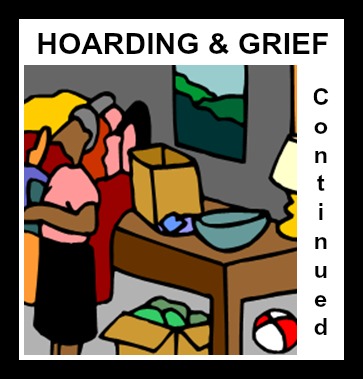A previous blog talked about hoarding and grief being related along with the fact hoarding affects more than the hoarder. What do you think is behind the reason why some individuals become hoarders in the first place? Delving further into past experiences of loss, plus past and present coping skills may shed light on this topic.
Perhaps, past experiences growing up as a child and/or loss experiences as an adult combine together to create unhealthy coping skills resulting in hoarding. A sense or need to hold on to material items may be used as a replacement for the love and connection not received from other avenues or due to a deep death loss or trauma experience.
Experiences that may be defined as disenfranchised— meaning something has happened to the hoarder at whatever age and they do not want to talk about it to anyone. Loss, grief, death, family and in some cases institutional physical and or sexual abuses in combination or separately can accumulate to create an environment of distrust and lack of control.
This is the part the outsider does not see or know about and if it has not been a part of your lived experiences your thoughts do not go to this area.
Another thought is CONTROL. For the hoarder this is a way of controlling what goes on in their life and it is none of your business! Just saying what I have been told.
The perception of not being loved and perhaps accepted by others is a perception on the hoarder’s part. In many cases there are family and friends who do love them and want to be supportive, but the hoarder stops any attempt to make the living space and their lives more socially acceptable.
The hoarder may appear to be anxious and stressed when others start to or try to remove some of the clutter. As an observer of a hoarder’s actions, you may notice the hoarder’s life becoming more isolated from others. The hoarder may deliberately make choices that prevent family and friends from visiting and then later complain that no one comes over to the house.
Confused, helpless and at times frustrated family and friends do not know what to do. The hoarder may be in denial that a “problem” exists. The need to acknowledge what is really going on in their mind and heart may help lead the hoarder on the path to wellness in all areas of their life, which can include you. Do not count on this happening.
Someone once said, “Love them anyway.”
Clear the clutter ~ when in doubt, throw it out.
By Cheryl Richardson
All my best,
Barbara Gillett Saunders
Grief Counsellor/Thanatologist
.

